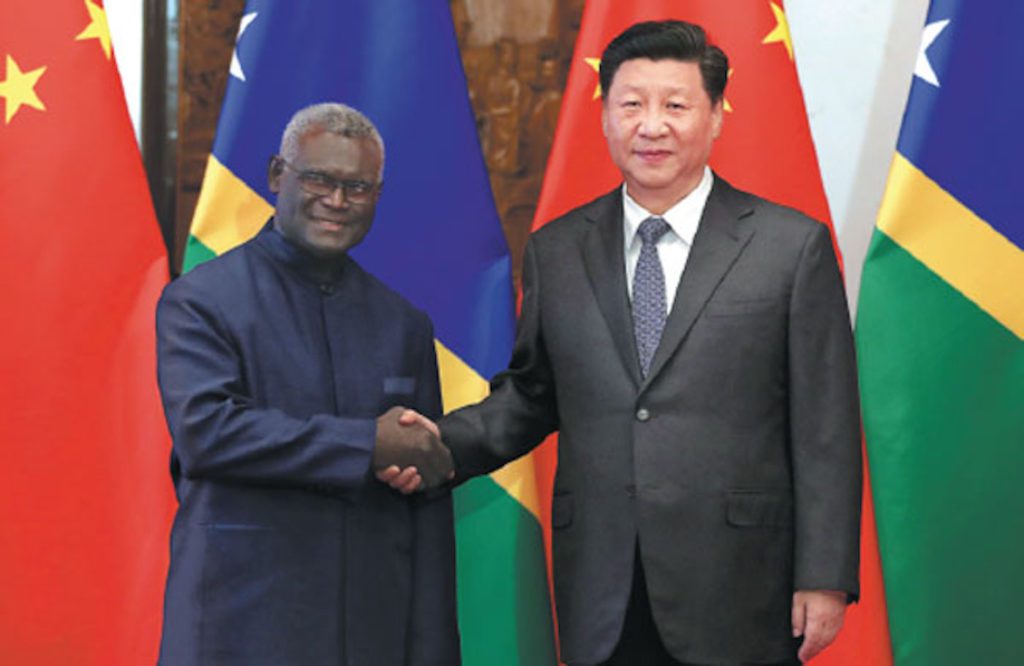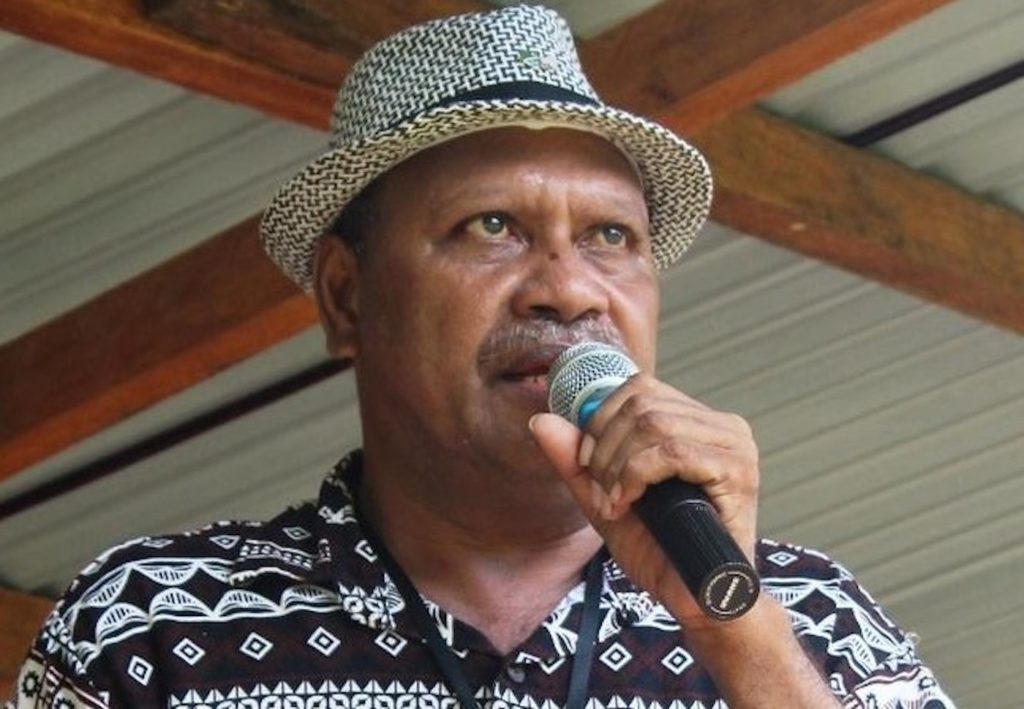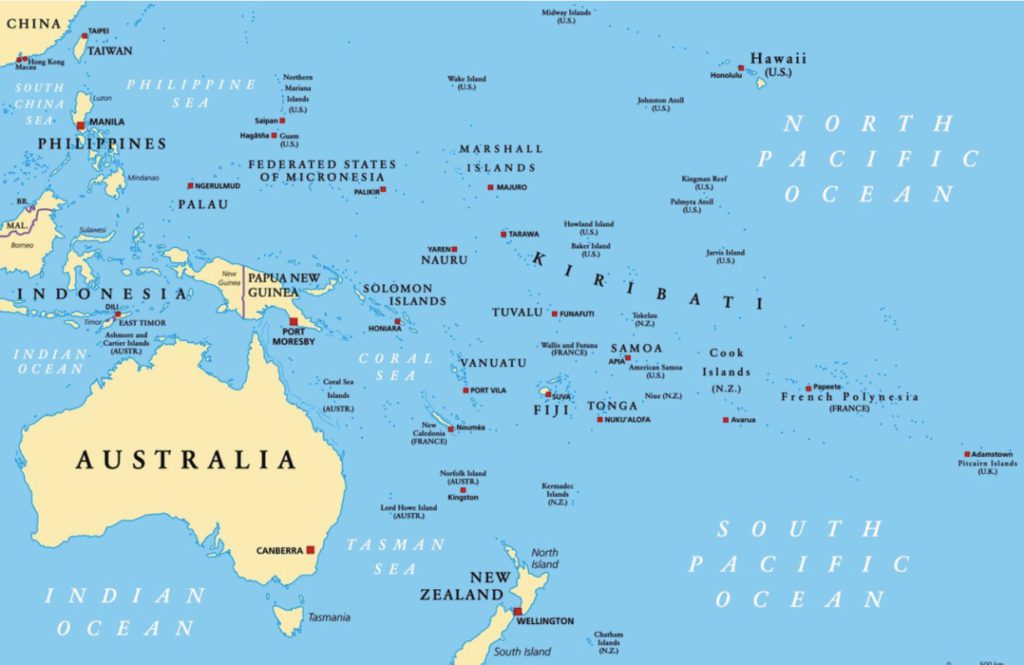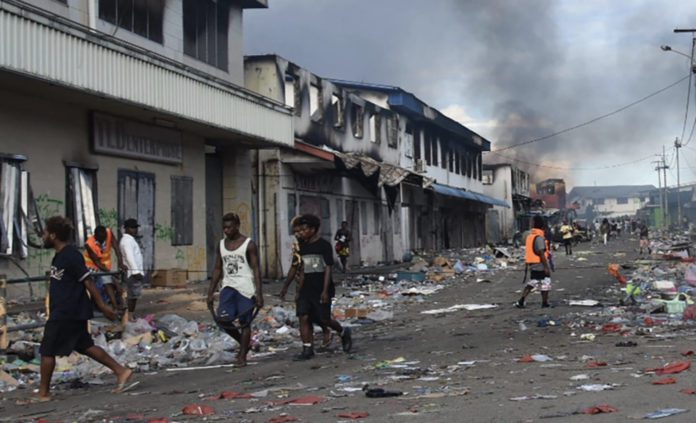Pacific nation instability presents a strategic opening for US to counter China but the Americans are nowhere to be found
Anti-government demonstrators in Honiara, the capital of the Solomon Islands, last week demanded the prime minister step down, citing his government’s alleged corruption and its ties to the People’s Republic of China (PRC). After the police fired teargas at the up until then peaceful demonstrators, chaos erupted.
An outbuilding at the parliament caught fire, a police station was attacked and mobs roamed the town. Over the next two days, much of Honiara’s Chinatown was burned and looted. One “Chinese” shop, festooned with Taiwanese flags, was spared, however.
Americans used to know about the Solomon Islands and why they matter. The word “Guadalcanal” was enough. That’s where US Marines and Japanese forces fought a long, bloody campaign in World War II.
But the US government has barely paid attention to the Solomons for decades, even though they are as important now as they were in 1942.
The Solomon Islands are “strategic terrain” in today’s contest between the PRC and the US and its allies. Hold the Solomons and you can isolate Australia from the US and the rest of Asia. And you can further dominate the Southwest and South Pacific – as Beijing is attempting as part of its long-term political warfare strategy.
The Solomons have been in China’s crosshairs for a long time. In 2019, the government of Prime Minister Manasseh Sogavare switched the country’s formal diplomatic recognition from Taiwan to the PRC.
Widespread reports and rumors claimed that Sogavare and other influential figures took Chinese cash (and orders) as part of the deal.

Other reports at the time said the Chinese planned to build a military base in the Solomons. The entire island of Tulagi was indeed under contract to a Chinese company until the Solomon Islands government canceled the deal after it was exposed and provoked public protests.
Following the diplomatic switch from Taiwan to the PRC, existing resentments festered – particularly in the populous Malaita province. Malaita’s Premier Daniel Suidani opposed the shift to Beijing and claims to have turned down bribes. Most Malaitans support Suidani and the province has even considered seeking independence.
Sogavare was reportedly not amused by the resistance to his plans, which included opening up Malaita’s vast resources to the CCP-linked companies of his patrons.
When Suidani needed urgent medical treatment earlier this year, the government attempted to prevent him from traveling overseas for necessary treatment – apparently hoping the “Malaita problem” would die with him. And the Australians didn’t help much either, though Suidani ultimately succeeded in getting the help he needed – in Taiwan.
After Suidani’s return, Sogavare reportedly pushed suspiciously well-funded local cronies to table a no-confidence resolution against him in the provincial parliament. However, public resistance was such that the “sponsors” had to withdraw the motion and apologize. Beijing was reportedly behind it all.
A little context is helpful: Recently arrived ethnic Chinese are regarded askance by many Solomons locals. The reasons are familiar wherever the Chinese diaspora is in the Pacific, where they often dominate local commerce, bring in Chinese workers for Chinese-funded projects and export the profits (and raw materials) so the locals see few benefits. And then there’s the organized crime and corruption that comes with it all.
So last week’s protests and rioting should not have been a total surprise. The Australians are now sending troops, police and a handful of diplomats to support the Sogavare government.

Foreign affairs never lack for irony. Consider that Australia – locked in a nasty economic and political fight with the PRC – is sending troops to support a Solomon Islands’ prime minister that the Chinese reportedly have got in their pocket. And Canberra is supporting him against citizens who want him to step down and Chinese influence eliminated.
Beijing ought to send the Morrison government a thank you note. There are Australians with on-the-ground knowledge of the Solomons – and with ideas on how to move things in a free nation direction. One wonders if Canberra pays them much attention, though.
As for the United States, most Americans don’t have the time or inclination to pay attention to the Solomon Islands. And presumably, the US Embassy has things well in hand. Or at least it would if there was a US embassy in the Solomon Islands. There isn’t one.
The Americans outsourced their foreign policy in this part of the world to the Australians. And by extension America’s interests are outsourced as well. No matter what you say, if you’re not there, you’re not interested.
And Washington has near-zero ability to read the local environment and politics – and to quietly influence local affairs. This is a lost opportunity: There is, in fact, a huge constituency in the Solomons who want the Americans around.
They’ve begged the Americans to open an embassy and even, according to some sources, to establish a military presence. The lack of presence – and interest – on Washington’s part leave many Solomon Islanders perplexed and disappointed.
Ex-president Donald Trump’s administration paid more attention to the Pacific islands than any previous administration. But it couldn’t really get its act together in Southwest and South Pacific in time to take advantage of opportunities to establish a US presence and support US interests.
In 2020, when the Sogavare government tried to economically squeeze Malaita province into compliance, the US ensured $25 million in USAID funds were allocated directly to Malaita. But that was seen as a hurried response to PRC inroads and was no substitute for a full-time presence, such as an embassy would provide.
One already knows the State Department’s excuses: Not enough money or diplomats. Really? There’s never any shortage of foreign service officers bidding on posts in Vienna and Brussels. But very few are angling to get to the Pacific where the living isn’t quite as plush – though the importance to US interests is immense.

As for pleading poverty? Maybe take the “R&R” and “home leave” money for US diplomats at hardship posts like London, Paris, Tokyo and the like and apply it to supporting a mission in the Solomons? It’s just a matter of priorities.
The US ambassador to Palau showed what a few of the right people in the right places can accomplish. Palau has steadfastly resisted Chinese blandishments and pressure to de-recognize Taiwan and, in 2020, it asked the Americans to set up a military base in the country. The Department of Defense isn’t exactly moving out smartly on this rare offer.
And the US military presence in the Solomons? It appears to be well hidden. There’s a regiment of bored officers building PowerPoint slides at INDOPACOM headquarters. Maybe a few of them can be spared?
And the US Marines ought to have paid some attention to the Solomons given their past history and the Commandant’s new strategy that calls for dispersing small units throughout the Pacific.
And if nothing else, somebody in DOD ought to have considered the disadvantage of letting an adversary establish itself in the Solomons and surrounding regions – and the cost of having to “re-take” these places in any conflict scenario.
Prime Minister Sogavare claims “outsiders” – i.e. the Americans – are behind the recent protests. That’s a good one; if he only knew.
That empty lot in Honiara where the US embassy should be sitting ought to tell him – and the Chinese – everything he and they need to know about American influence in the Solomon Islands.
So what’s to be done? Washington ought to remember that line: If you’re not there, you’re not interested. “Being there” would be a good first step.


